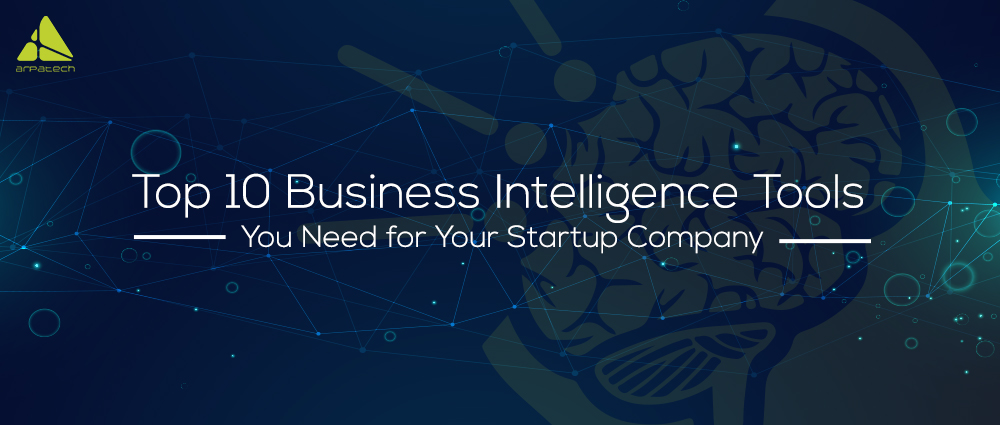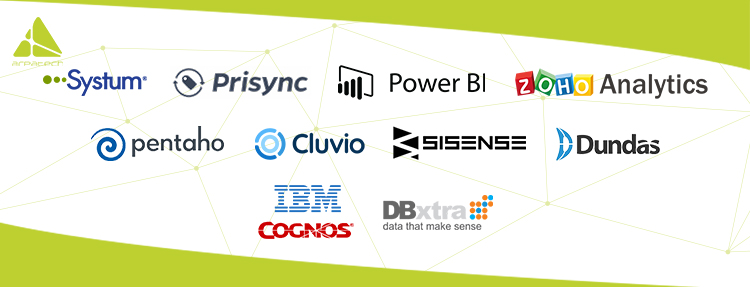Top 10 Business Intelligence Tools You Need for Your Startup Company

Business Intelligence (BI) tools help you in deriving insights from your internal data that helps businesses in making tactical and strategic decisions. It is often used interchangeably with business analytics or data analytics. BI is the discipline of recognizing company requirements and finding alternatives to various business issues. In simpler words, it is a set of functions and techniques that work as a link between stakeholders. They help them recognize the structure, policies, and operations of the organization. They can also recommend alternatives to assist the business in achieving its objectives.
Business Intelligence analysis is applicable to the following areas:
- Provides analysis of customer behaviors, buying patterns and sales trends
- Improves overall process and operational performance
- Tracks, measures and predicts sales and financial performance
- Budgeting, financial planning and estimating
- Tracking the performance of marketing campaigns
- Greatly improves delivery and supply chain.
- Offers web, social media and e-commerce analytics
- Effective customer relationship management
- Risk analysis
Top 10 BI Tools Your Startup Company Needs

Various IT companies are providing customized business intelligence solutions. Here is a list of Top 10 Business Intelligence Tools You Need for Your Startup Company:
1. Dundas
Dundas is an intuitive drag and drop functionality. It has been there in the market for around 25 years already. Dundas can help you in transforming data into visually appealing and understandable reports that can be substantially customized. With the analysis of these reports, you can draw the right conclusions without the need of an analytical team. It also offers a 45-day free trial. Moreover, it has flexibility in pricing which enables it to fit the needs of different users.
2. DBxtra
In case if you are a non-technical person, DBxtra can help you in generating the type of insights traditionally reserved for coders. It can help you integrate with all types of databases without having a deep knowledge of SQL. Once you get all the data, you can put them into charts, tables or even in a presentation. With one of its main features, it can generate reports. Apart from this, you can create interactive dashboards, pull data right into Excel, or auto-generate and distribute reports. DBxtra also offers 30 days free trial so that you can try before you make a purchase.
3. Sisense
This is another tool for non-techy individuals. Sisense is quite user-friendly through which anyone in your team can manage huge and complex number of datasets. Moreover, they can also visualize and analyze them without the interference of your IT department. Not to forget, it gathers data from a number of sources including Adwords, Google Analytics and Salesforce. It also incorporates in-chip technology which makes data processing quick as compared to others.
4. Zoho Reports
Zoho‘s business intelligence is considered as the best solution for larger businesses and data sets as compared to all others mentioned here. It is able to incorporate information from a wide variety of sources and transform it into a visually attractive and easy-to-understand report for marketing, sales, and other departments. Zoho also offers a 15-days free trial after which you can go for a subscription plan which suits your business requirements and is friendly to your pockets.
5. Systum
It is a business intelligence tool that allows organizations to streamline and improve procedures across numerous B2B and B2C channels in order to increase productivity and effectiveness. It involves a multitude of marketing features, built-in CRM, Inventory Management, B2B and much more. Systum also provides a wide spectrum of integration options, including Amazon, eBay, and QuickBooks.
6. Prisync
With user-friendly dashboards and strong reports, e-commerce operators have a diverse understanding of the pricing of their competitors and the product assortments they place on the market. Whether it’s SMBs or Fortune 500, they all are dependent on Prisync’s data to get detailed C-level analysis and execute their A-game to upsurge sales growth and ROI. With the 24/7 customer support team to respond to your queries by making sure you get more than what you have paid for. Prisync offers free onboard service to plan a long-term partnership with all of its clients. It sends notifications and thorough Excel sheets from the market on a regular basis, whether daily or instant, to keep you updated and well within the game.
7. IBM Cognos Intelligence
IBM Cognos Intelligence is a cloud-based business intelligence and analytics tool that can help you in visualizing, analyzing and sharing insights about your business. A number of factors hinder the process of analyzing your business data to comprehend performance and recommend improvements including data storage, various platforms and undue reliance on spreadsheets. It offers a set of tools for reporting, analytics, score carding and tracking of incidences and metrics. This software comprises of several components intended to satisfy the divergent data requirements of a business.
IBM Cognos Intelligence can help you explore information from different angles and perspectives and compare it with data in motion and trends for a more extensive view of your business. The facts you need for better results are right at your fingertips.
8. Microsoft BI platform
Microsoft Power offers non-technical business users with tools for information aggregation, analysis, visualization, and sharing. BI’s user interface is relatively intuitive for customers who are accustomed with Excel, and its extensive integration with other Microsoft products makes it a very flexible self-service tool that needs little upfront training. It includes analysis services, integration services, master data services, reporting services, and several client applications used for making or working with analytical data. Analysis Services and Reporting Services can be installed as stand-alone servers, in scale-out settings, or as shared service apps in a SharePoint farm. A free version of Power BI is designed for SMB owners; a professional version called Power BI Plus is accessible for a monthly subscription fee.
9. Pentaho
It is yet another commonly used tool with both open source and a paid version. Pentaho offers helpful basics including data visualization tools like geo-mapping or heat graphs. Also, it provides reporting in a variety of output forms such as PDFs, Excel, and HTML. Apart from that, CT tools are included which gives you the capacity to create custom dashboards on top of Pentaho. As a result, you get impressive amount of control over the program, letting you create more advanced dashboards or incorporate extra visual aids for reports. On the other hand, the software is free, and if your needs are basic or you just want to try something out, the Pentaho community version may be for you.
10. Cluvio
Cluvio lets you run SQL queries against your database, process data in R, visualize and create interactive dashboards in no time. This platform is set up for the needs of startups and data-driven teams. With easy to understand dashboards, you can add customized time-base and filters, get charts, write SQL and share your dashboards with your team and even with your customers. Additionally, it provides automatic recommendations and alerts to facilitate your work. Cluvio also enables powerful embedding that allows you to readily add analytical features to any website or web application. It has a free subscription to begin with and comparative cheap subscription packages.
Latest posts by Moiz Khan (see all)
- How to Use AI to Enhance your SEO Strategies? - August 31, 2023
- What You Need to Know About Test Automation in DevOps - August 30, 2023
- 6 Cloud Computing Challenges That Businesses Need to Be Aware of - August 22, 2023

 Careers
Careers


